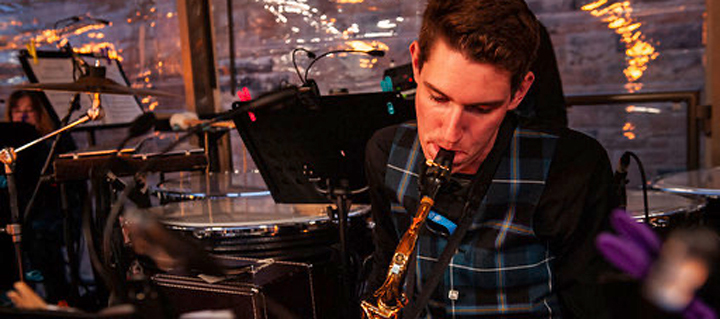Kyle Campbell, MRes Music student

Kyle graduated from Music BA in 2020, then started the Music MRes straight after. He talks transferable skills, societies, and bridging the gap between undergraduate and postgraduate study.
“The main reason for choosing Nottingham for my MRes was I’m familiar with the staff and facilities, and that way I’m just continuing my research with the same people. It’s really helpful because they know all the background information, and I’m also continuing with my supervisor from my third-year dissertation.
Rebecca Thumpston-Gallagher, who was my supervisor, really helped me progress from last year to this year. Also Hannah Thuraisingam Robbins was my personal tutor and I did a lot of talking through with her about things, which was really helpful.
If you'd have asked me a year ago, I would have been like ‘I’m not doing a masters’, but because of the Covid-19 situation and because I didn’t know what I wanted to do as a job, it was a way of buying myself a year but also doing something worthwhile.
With the MRes, as it’s research based, you’re shaping your own projects. It’s all my own personal research."
With the Specialised Studies modules you don’t have to do everything on one topic. This term I’m looking at American protest music, where my final project is looking at the BBC Proms and British music. I can pick the things I’m interested in. That’s really important to me.
From undergraduate to postgraduate
“The most important thing I gained from my undergraduate degree was building connections. You get to work with so many different people and on the BA Music there’s so much variety, you can really pick and choose what you want to do.
I took quite a musicology approach in my third year, but before that I was doing some composition modules, some performance modules, ensemble modules...
In your first year, where you’ve got a lot of your modules all together, it’s a really tight knit community. Then you meet so many more people in your second and third year as well, you have the opportunity to get to know everyone in the department. You also have the wider music community with all the societies."
A music community
“The societies are quite a heavy part of what we do. There’s so much going on and the course feeds into it. You get the opportunity to meet a lot of other people in the University, you spend a lot of time with other students not in the department or even faculty. It’s really nice.
I’m a principal study clarinettist, I also play the saxophone. I’ve got conducting experience through the university, too, through the conducting module – which is one of the best modules here – it gives you practical experience from professionals.
I’ve also been an Assistant Conductor for Blowsoc’s Wind Orchestra and got professional tutoring through that. I’ve been heavily involved in Blowsoc and still am through my postgrad. I’m Vice-President this year as well. I also conducted Mussoc’s Sinfonia last year, which is a full-scale orchestra."
Skills for success
“I’d definitely recommend a postgraduate qualification. You’re building up a lot of skills.
One core module is ‘Mastering the Arts’, which is really helpful. It’s more about general skills, research skills that you build and actually that’s made me have a different way of thinking."
It’s the way you approach a project, building a team from different disciplines – that’s something you’d have to do in the workplace. You’re not going to be the expert of everything. You need the communication skills, you’ll need to know when to approach other people with their expertise and then build your team around that. It’s something that I’d perhaps thought about before, but not in that context.
Future ambitions
“I’m still not entirely sure what I want to do, but I’m looking at the forces and going in as a musician. I’m currently going through the Army application audition process.
I played in the Royal Edinburgh Military Tattoo in 2019. While up there I was talking to loads of army musicians who were there performing, and got the taste of it from that. It’s performing in a professional career in music but without having to go to a conservatoire and getting regular performance travel opportunities, which really appeals.
I think if I was enjoying what I was doing, then that’s what you aim for. A good salary is always nice, but that shouldn’t be the be all and end all, it should be I’m enjoying what I’m doing."
Kyle's advice if you're considering a Music degree at Nottingham
- "Don't be afraid to try different things. Always be open, especially during the first-year of your course. Have a go at everything - you never know what might jump out at you that you enjoy
- Ask for help at times – people are always willing to help"
Go further
Find out more about our Music degrees